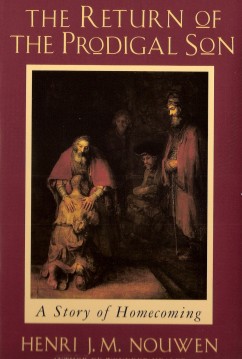By Mark Azzara

Nouwen was inspired to write his book after a years-long contemplation of Rembrandt’s painting with the same title, which led him to realize how much of a sinner he was and how desperately he needed to know God’s embrace and forgiveness. For a priest, that’s quite a confession.
My friends and I have shared a lot of thoughtful remarks, many made with trepidation rather than certainty as we try to find our way toward that greater closeness with God, ourselves and one another.
After our meeting two weeks ago I checked my email, which eventually led me to Huffington Post’s religion page. There were several HuffPost articles but none intrigued me because they were just a bunch of voices screaming at me. But they led me to think about all the voices we listen to every day.
Whether we know it consciously or not, you and I choose the voices we heed and the voices we ignore. And we must make our choices very carefully because a lot of voices out there will destroy us if we listen to them. That’s the point of Nouwen’s book.
Nouwen confesses listening to some of those voices. When this highly acclaimed but greatly troubled Catholic priest truly struggled to really hear God’s voice, he discovered it was totally unlike the voice the world claims it to be. His book is a confessional of sorts, and his life is so much like mine that I say to myself, “I could have written that.” Seriously.
Nouwen was a writer. So am I. He wrote about faith. So do I. He deeply believed what he wrote. So do I. He had a following. So do I (if you consider maybe a dozen people to be a “following”). But Nouwen ultimately concluded that, despite many books, great teaching moments and various accolades, much of his life had been a waste.
That’s why I took a week off. I had to ask myself and God if all my work has been a waste, too. And guess what? Most of it was. That makes me wonder – seriously – how long I’ll continue writing. One thing I know: If I continue writing beyond this blog, my writing will change in ways I can scarcely imagine.
I have been forced to confess that I, too, I have written a lot of stuff, which, while it’s not bad, doesn’t really convey truth as God defines the word. You must experience truth in order to know what it is. Nouwen experienced the truth of God’s love for him and then took the time and the courage to share that truth, as best he could, with us.
I have been forced to confess that I have spent too much time writing about God and not nearly enough time listening to Him. I tried for most of my life as a journalist to be another voice in a world that already has way too many of them, just to convince myself that I “know” things when, in reality, I know practically nothing.
Even before reading Nouwen I can point to entries in my journal that say some of the things Nouwen has said far better. It’s proof to me that I am on the same track as Nouwen as I slowly learn how to “be still and know that I am God,” to quote Psalm 46:10.
Being still is something that I must pursue intentionally and at length. It doesn’t come naturally, nor does it happen quickly or easily. And it doesn’t just mean being silent.
To be still means that I quiet my restless spirit, sit peacefully, relax, and ignore all the other voices that seek to distract me, especially the voice within me that wants to speak and thus prove that it doesn’t need to know anything new, different or challenging. It means I surrender my desire to be another voice, no matter how faint.
To be still is not to enter into some hypnotic trance. It is to remain consciously alert to the presence of God with me. At first that’s a tad uncomfortable.
To be still and “know that I am God” is to confess that God knows all — i.e., he has all knowledge and knows all people. And that’s a very uncomfortable place because that means he knows me better than I know myself.
To be still ultimately forces me to confess that I don’t know myself or God. And that, at first, is a deeply uncomfortable place because it means that I must learn who I am from the one who knows me – sins and all.
What Nouwen heard, when he slowly and nervously entered that stillness, is that God loves him in gentleness and compassion and forgiveness, with no regard for what he had made of himself, good or bad. And through Nouwen’s words, and those of my brothers in the men’s group, I am hearing the same message about myself.
It is a voice I am slowly craving to hear.
My question: What voice do you want to hear right now?








The stillness of resting in the embrace of God is not one of solitude. It’s a stillness of presence in a loving relationship and the dynamic of “other”, namely Jesus, is experienced as embracing forgiver who offers love unconditionally! We must rest our head upon Him and be loved. Like Rembrandt’s, The Return of the Prodigal Son, can we also participate in DaVinci’s, Last Supper, by being the disciple that lays his head upon the bossom of Christ? There lies the intimate heart to heart that God longs for us to experience.